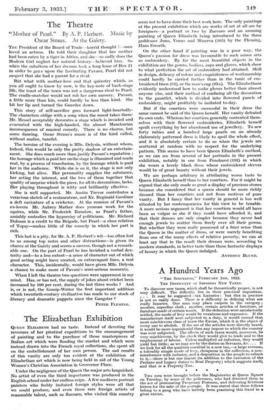The Theatre
"Mother of Pearl." By A. P. Herbert. Music by Oscar Straus. At the Gaiety.
THE President of the Board of Trade—horrid thought !--once loved an actress. He told their daughter that her mother had been eaten by a tiger in Africa, and she—so sadly does the Modern Girl neglect her natural history—believed him. So when the subaltern of her dreams took a long lease of Box 21 in drder to gaze upon the fascinating Pavani, Pearl did not suspect that she had a parent for a rival.
Brit what with mother-love and that quixotry which, as you all ought to know by now, is the key-note of back-stage life, the toast of the town was not a dangerous rival to Pearl. The cradle-snatcher would not rob her own nursery. Pavani, a little more than kin, could hardly be less than kind. She bit her lip and turned the Guardee down.
This story of self-sacrifice goes forward light-heartedly- The characters oblige with a song when the mood takes them
Mr. Messel acceptably decorates a stage which is invaded and evacuated with the high-handed, the almost Manchurian inconsequence of musical comedy. There is no chorus, but some dancing. Oscar Straus's music is of the kind called, without malice, tuneful.
The heroine of the evening is Mlle. Delysia, without whom, indeed, this would be only the pretty shadow of an entertain- ment. She does much more than justify Pavani's reputation ; the homage which is paid her on the stage is illumined and made real, by a process of transfusion, by the homage which is paid her in the audience. While she is on it, the stage is not only kicking, but alive. Her personality supplies the substance, her acting the interest, and the two of them together that quality of surprise which the piece, for all its decorations, lacks. Her playing throughout is witty and brilliantly effective.
She is well supported- Mr. Austin Trevor contributes a veracious sketch of a restaurateur, and Mr. Reginald Gardiner a deft caricature of a cricketer. At the reunion of Pavani's ex-lovers Mr. Aubrey Mather does yeoman work for the squires, while Mr. Frederick Ranalow, as Pearl's father, amiably embodies the hypocrisy of politicians. Mr. Richard Dolman is a credit to the Brigade, but Pearl—a close relation of Topsy—makes little of the comedy in which her part is rich.
This last is a pity, for Mr. A. P. Herbert's wit—too often lost to us among top notes and other distractions—is given its chance at the Gaiety and scores a success, though not a remark- able one. On the part of Pearl he has lavished -a verbal dex- terity and—to a less extent—a sense of character out of which good acting might have created, on extravagant lines, a real character. This, incidentally, would have given Mlle. Delysia a chance to make more of Pavani's semi-serious moments.
When I left the theatre two questions were uppermost in my mind. Has, or has not, the supply of jokes about cricket been increased by 100 per cent. during the last three weeks ? And is, or is not, the Gossip-Writer the first important addition- which twentieth-century civilization has made to our stock of literary and dramatic puppets since the Gangster ?
PETER FLEMING.




































 Previous page
Previous page